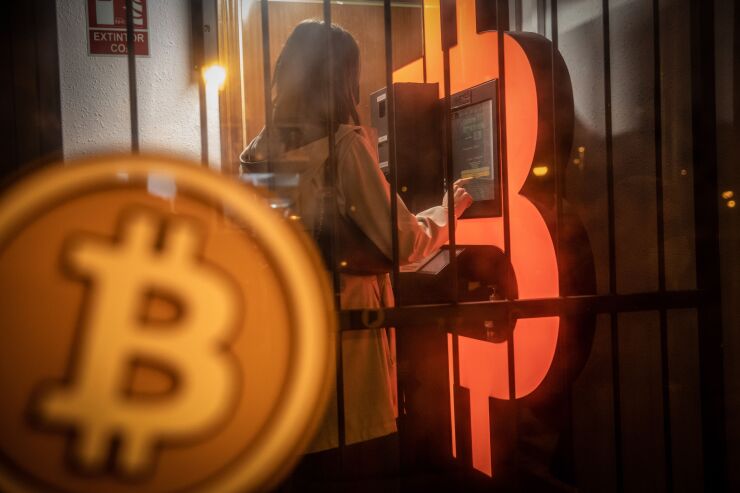The price of bitcoin, dogecoin and other digital currencies can rise and fall drastically because of something as simple as a
The concept of a crypto kiosk isn't new, but many so-called bitcoin ATMs only allow users to buy crypto rather than exchange it back into cash for withdrawal. The bitcoin ATM brand Lamassu, for example, describes its device as a "
The MoneyGram-Coinme arrangement will go live at 12,000 locations in the U.S., drastically expanding the options for selling bitcoin in person.
This week's sudden

MoneyGram regards the Coinme partnership as a turning point for the cryptocurrency industry on two fronts.
"It's an important evolution of our strategy as we monetize our capabilities in new ways and leverage the strength of our global retail footprint and digital transformation to offer innovative new services to new types of customers," MoneyGram CEO Alex Holmes said earlier this month during the company’s earnings call.
From a broader industry perspective, MoneyGram views the partnership with Coinme as "pivotal to the cryptocurrency space" because of the important bridge it builds to local currencies, Holmes said of the option to buy bitcoin for cash at the retail location.
In addition, making cryptocurrency more available and less mysterious allows the money transfer company to close that gap for potential users who can now view a MoneyGram kiosk as a place to do crypto business. The money transfer company is pushing the concept as ideal for first-time bitcoin investors.
Holmes refers to it as expanding access to more people by "providing streamlined on and off ramps" to those local currencies.
“The ability for anyone to walk into a MoneyGram location and load that wallet [with bitcoin] or unload that wallet is a pretty exciting service opportunity,” Holmes said during the earnings call.
It was a strong follow-up move for MoneyGram, which had
Holmes does not, however, see the Coinme partnership as a replacement move in the aftermath of the Ripple partnership crumbling.
While the partnership with Ripple had more to do with the actual flow of funds and interacting with the Ripple network, the partnership with Coinme is more about moving money into the Coinme wallet and allowing consumers to buy bitcoin, Holmes explained in a recorded Coindesk interview.
"After the bitcoin is in the Coinme network, a consumer can trade or sell the bitcoin and pull the cash back through the MoneyGram network and then into their pocket," Holmes added.
In the future, Holmes predicts blockchain and crypto will become more prominent "in terms of ledgers and movements, and settlements and flow of funds."
Different visions for bitcoin
The major card brands and some of the largest banks would benefit from a mainstream surge for cryptocurrency, as they have all come forward with new strategies focusing on how to add value to the ecosystem with more security and the
In some cases, only longtime business customers would have access to cryptocurrency, or the tokens would have specific purposes, like being the currency of choice for wholesale transactions. As part of the equation, the safety and transparency of blockchain distributed ledgers have almost always garnered the most attention.
"Different companies have different visions" for crypto advancement, said Jared Drieling, senior director of market intelligence and insights at The Strawhecker Group. "PayPal has a vision to change the world, but that's not where MoneyGram and Coinme are focused."
It's a big crypto play for MoneyGram, however, as it seeks a way to get more individuals involved in the payments ecosystem overall, particularly the unbanked or underbanked, Drieling said. "But it is the same play with PayPal or the banks," he added.
PayPal allows U.S. users to
As part of Facebook's ongoing push for its token currency,
As opposed to creating an avenue for bitcoin investors to quickly buy or sell, depending on how their investment is performing, the push by current players involved is to create some type of ubiquity in the future, Drieling noted.
"You can't roam around your neighborhood with a cryptocurrency wallet and find that everyone can accept it and you can leave your cards at home," Drieling said. "It's going to be hit or miss with every retailer in terms of cryptocurrency, and that lack of ubiquity still exists even with some mobile wallets."
Yet, there is no denying cryptocurrency is edging toward mainstream use as more players get engaged — and access to buy or sell bitcoin unfolds even at the local wire transfer kiosk.
London-based digital wallet provider Sticpay reported that cryptocurrency deposits in their wallets increased by 48% in the first quarter of this year, while deposits with traditional currency remained flat.
E-wallet customers were converting their country's currency to crypto at an increase of 185% compared to the same period last year, while those converting crypto to other currencies dropped 12%.
Sticpay says it provides a global e-wallet service to customers in more than 190 countries, focusing mostly on those engaging in e-commerce or foreign exchange transactions.
"Cryptocurrencies are increasingly being accepted as a trusted monetary value," said James Bay, client service director at Sticpay. "But we have to say it's bitcoin that's leading the change in payment habits — and an outlook that is challenging fiat currencies."





